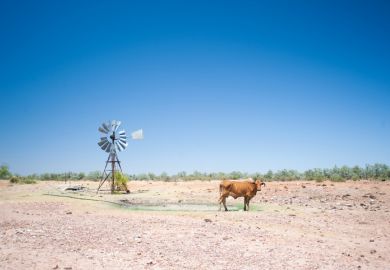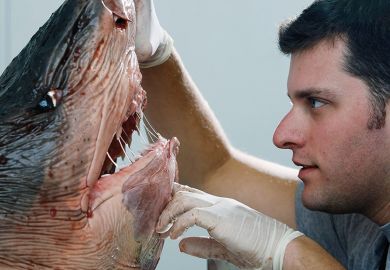Cuts to Australian university research will be substantially bigger than the sector feared, with PhD scholarships caught up in a previously announced funding freeze.
The mid-year budget update unveiled cutbacks about A$200 million (£114 million) worse than most analysts had anticipated in the wake of the government’s November revelation that it would cap funds to the Research Support Program.
The budget update, revealed on 17 December, says that the “growth adjustment” will now be applied to all research block grants. The block grants comprise not only the RSP – which helps universities cover indirect research expenses such as running labs, paying technical staff and buying consumables – but also the Research Training Program, which funds scholarships for research students undertaking doctoral and master’s courses.
In total, the change will cost the sector A$329 million – almost two-and-a-half times the A$135 million that the government promised in November to boost regional university provision.
Universities had expected that the cuts would merely cancel out the November commitment, which was centred on marginal electorates and criticised as an election bribe.
Representative body Universities Australia condemned the cut as a “ram raid” to round off a year of funding clawbacks. “The budget is forecast to return to surplus and yet the government has decided to cut funds to research which drives economic growth. This makes no sense,” said chief executive Catriona Jackson.
With the budget documents offering scant detail, higher education policy analysts were seeking more information on how the cuts will be applied. Times Higher Education understands that indexation of research block grants will be paused for 12 months, saving the government A$131 million, with a four-year capping of the RSP delivering another A$197 million.
Education minister Dan Tehan said the savings from the block grants would “allow the government to prioritise education spending, including on regional higher education”.
Budget documents show that, in addition to the extra A$135 million promised for regional higher education in November, the government is giving the University of New South Wales A$14 million to establish a library at Canberra’s Old Parliament House. Named after former conservative prime minister John Howard, it will feature official papers and other items from Mr Howard’s administration.
Other savings from the research funding cuts are likely to go towards school education, which has been a political sore point for the government.
The Innovative Research Universities group estimated that the cuts would reduce the block grants by about 6.5 per cent each calendar year, in “another horror budget” for universities. It would further damage their research capability in the wake of last year’s freeze on university teaching grants, and meant that universities which honoured their commitments to current students would be forced to reduce future research student intakes.
“Cuts to research block grants are short-sighted and unnecessary, particularly when the overall economic outlook is finally looking better,” said IRU executive director Conor King. “We have the chance to invest now in future capability, not back away from it.”
The Council of Australian Postgraduate Associations slated the change as a “brutal” move from “a government which is openly hostile to universities”. It called on the opposition Labor Party to commit to reversing the cut ahead of next year’s election.
Register to continue
Why register?
- Registration is free and only takes a moment
- Once registered, you can read 3 articles a month
- Sign up for our newsletter
Subscribe
Or subscribe for unlimited access to:
- Unlimited access to news, views, insights & reviews
- Digital editions
- Digital access to THE’s university and college rankings analysis
Already registered or a current subscriber?








